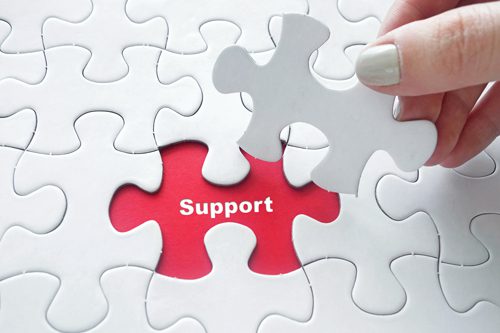
Your loved one is back from her addiction recovery program, but that does not mean that she is cured.
Addiction Can Be Treated, Not Cured
Most professionals in the addiction recovery community agree that there is no cure for addiction. Still, studies seem to show that each year of sobriety makes relapse less likely. Of those in their first year of sobriety, two out of every three people will relapse. In the second year, that figure drops to one out of two people—nearly a 17% decrease. By year five, there is only a 15% chance of relapse.
The high initial rate of relapse should not be taken as a sign that the newly sober are in any way uncommitted. Treatment programs require an incredible amount of self-work. After an initial “detox” period, people in recovery strive to identify the underlying causes of addiction, a process which requires deep emotional investment.
But, as challenging as such programs can be, the period immediately following the treatment program is often far more stressful for those in recovery. In your loved one’s treatment program, he was in a setting where everyone had similar experiences and goals. In the general community, he may feel isolated without that regular mutual support. Whereas inpatient treatment programs provide a healthy routine, the lack of structure in the outside world can threaten those newfound healthy habits.
Without a safe community, environment, or schedule to fall back on, the business of staying drug and alcohol free becomes much more complicated. So, it is all the more important for trusted friends and family like you to remain active, to be her “safe place” on the outside. There are some simple steps you can take to support your loved one in the lifelong process of recovery.
Note: This final article in the “Do’s and Don’ts” series will focus specifically on encouraging recovery post-rehabilitation. If your loved one has not yet arrived at this phase of recovery, read previous articles:
- The Do’s and Don’ts of Supporting a Loved One with Substance Abuse (Part 1), how to support your loved one before rehabilitation.
- The Do’s and Don’ts of Supporting a Loved One with Substance Abuse (Part 2), how to support your loved one during in- or outpatient treatment.
Encouraging Recovery Post-Rehabilitation
DO
- Communicate how you would like to help. Of course you want to be there for your loved one, but your tacit support might not be so obvious to him. Whether you want to serve as an unofficial sponsor (available for whatever, whenever, wherever) or just express your general support and openness to talk, these things need to be said aloud. In his treatment program, your loved one has been working on communicating openly and honestly. By starting with openness and honesty yourself, you are setting the tone for your relationship and helping him to apply hard won skills outside of the treatment program.
- Include her in group activities. Think about how your friend/family group socializes. Now, how much of that group time involves substance use or other potential triggers? It is wonderful that you want to strengthen your one-on-one relationship with your loved one, but not having her needs considered in group activities could make your loved one feel rejected and excluded.
Setting up some regular activities that do not interfere with your friend’s sobriety can be a very powerful change. There are many lists of fun, new, and adventurous sober activities out there (like this one) and even a social network connecting people with substance-free activities and events. Pick as many ideas as you want, and pitch them to the group. There is no need to say why you are suggesting a change in routine. Just go with it, and your loved one is sure to feel that love!
- Encourage growth and discovery. Researchers believe that social connectedness can significantly diminish the chance of relapse. Voice your support when your loved one makes changes to ingrained physical and emotional patterns. If your loved one joins a club, starts applying for jobs, or alters his response to known relapse triggers (e.g., hunger, anger, loneliness, tiredness; or, H.A.L.T. for short), recognize and reinforce those changes in behavior. If your loved one can find happiness in human connection, substance use loses one of its strongest psychological appeals.
DON’T
- Fall into old, unhealthy routines. Interpersonal dynamics adjust to accommodate addiction. You may be unconsciously giving your loved one’s addiction room to thrive if you fall back into these old patterns of behavior without realizing it. On top of everything else, it can be hard to change the very way you interact with your loved one. But by cutting off your own enabling behaviors, you are ultimately building a stronger and healthier relationship with your loved one.
- Get discouraged by relapse. As the statistics suggest, for many people in recovery, relapse is simply part of the program. After addiction has already taken such a toll, relapse can be emotionally draining for friends and family, not to mention the person in recovery. Practicing recovery does not come easily. Knowing that, treat your loved one’s relapse as you would any other painful setback they might experience. Ditch the toxic shame, and encourage everyone involved to seek the extra support they need (your loved one, your family, and yourself included!).
A person in recovery is never fully out of the woods, but lifelong recovery is possible because of your loved one’s bravery and determination, the support of the addiction recovery community, and you. Addiction recovery is a long, winding journey, but your loved one is lucky to have such a compassionate person by her side.

Sources:
- psychologytoday.com/blog/craving/201402/how-often-do-long-term-sober-alcoholics-and-addicts-relapse
- psychologytoday.com/blog/love-and-sex-in-the-digital-age/201509/the-opposite-addiction-is-connection
- psychologytoday.com/blog/some-assembly-required/201605/addiction-family-affliction




